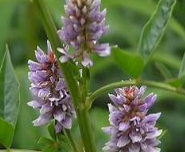The Counter-Effect of <i>Glycyrrhiza glabra</i> Against Gastrointestinal Tract Toxicity of Indomethacin on Rats
http://www.doi.org/10.26538/tjnpr/v7i10.22.
Keywords:
hemoglobulin, iron, vitamin B12, gastritis, indomethacin, gastroprotective, Glycyrrhiza glabra LAbstract
Glycyrrhiza glabra L. has been used in treating various medical conditions, including stomach disorders such as flatulence and dyspepsia. Its anti-ulcer activity has been reported to be conflicting. The present study aims to evaluate the protective effects of G. glabra extract on indomethacin-induced gastritis and other gastrointestinal toxicities in rats. Thirty Wistar rats were used in the study and divided into three groups, ten rats in each group. Group I (Control) had free access to standard rat food and water; Group II (Test) had indomethacin administered orally at a dose of 30 mg/kg, given daily; Group III (Intervention) had an ethanol extract of G. glabra administered at 200 mg/kg body weight suspended in distilled water. G. glabra was collected locally in Egypt. The gastroprotective effect of the extract was studied in rats in combination with indomethacin. The present study shows that G. glabra extract significantly protects the stomach mucosa against indomethacin-induced gastritis in rats, where the inflammation grade caused by a combination of extract of G. glabra and indomethacin in the intervention group was less than that of the test group with indomethacin alone (p < 0.01). However, the inflammation grade of gastric mucosa in the intervention group was insignificant compared to the control group (p > 0.01). Furthermore, G. glabra extract significantly increases gastric pH, decreases the stomach’s secretion volume and total acidity, and enhances serum iron, hemoglobulin, and vitamin B12 levels (p ≤ 0.05). Based on the results of this study, it was concluded that G. glabra exerted a gastric protective effect.
References
Parveen A, Singh A, Rajendiran A, Jough SS, Verma SK. Herbal elicited Hepatoprotection and Hepatotoxicity–A Comprehensive Review. Asian J Pharm Res. 2022;12(2):155–61.
Shi Y, Leng Y, Liu D, Liu X, Ren Y, Zhang J, Chen F. Research advances in protective effects of ursolic acid and oleanolic acid against gastrointestinal diseases. Am J Chin Med. 2021;49(02):413–35.
Thakur P, Thakur U, Kaushal P, Ankalgi AD, Kumar P, Kapoor A, Singh Ashawat M. A Review on GC-MS Hyphenated Technique. Asian J Pharm Anal. 2021; 27;1(4):285–92.
Rajasekaran R, Suresh PK. Physical and chemical methods of extraction of bioactive molecules from Lepidium sativum Linn. And antioxidant activity-based screening and selection of extracts-probable phytochemical, chromatography and mass spectroscopy analysis-based correlates. Res J Pharm Technol. 2021;14(6):3082–92.
Salunke C, Chittam K, Pawar A, Chaudhari H. Development of an Analytical Method to Determine Extracts of Different Species of Glycyrrhizin by HPTLC. Res J Pharm Dos Forms Technol. 2020;12(2):89.
El-Saber Batiha G, Magdy Beshbishy A, El-Mleeh A, M. Abdel-Daim M, Prasad Devkota H. Traditional uses, bioactive chemical constituents, and pharmacological and 6.toxicological activities of Glycyrrhiza glabra L.(Fabaceae). Biomolecules. 2020;10(3):352.
Michielsen HJ, De Vries J, Van Heck GL, Fiorillo A, Gorwood P, Braga-Neto MB, Warren CA, Oriá RB, Monteiro MS, Maciel AAS, Brito GAC, Lima AAM, Guerrant RL, Brooks SK, Webster RK, Smith LE, Woodland L. Mental Health Care Measures in Response to the 2019 Novel Coronavirus Outbreak in Korea. Dig Dis Sci. 2020; 14;17(2):85–6.
Gunjal SD, Shirolkar S V. Optimizations of Spray Drying Process Parameters for Liquorice ( Glycyrrhiza glabra Linn. ) Extract. Res J Pharm Technol. 2018;11(11):51-05.
Tewari D, Stankiewicz AM, Mocan A, Sah AN, Tzvetkov NT, Huminiecki L, Horbańczuk JO, Atanasov AG. Ethnopharmacological approaches for dementia therapy and significance of natural products and herbal drugs. Front Aging Neurosci. 2018;10(3):3-10
Turkyilmaz IB, Coskun ZM, Bolkent S, Yanardag R. The effects of antioxidant combination on indomethacin-induced gastric mucosal injury in rats. Cell Mol Biol. 2019;65(3):76–83.
Kwon DA, Kim YS, Baek SH, Kim SK, Kim HK, Jo SK, Jung U, Park HR, Lee HS. Protective effects of a standardized extract (HemoHIM) using indomethacin-and ethanol/HCl-induced gastric mucosal injury models. Pharm Biol. 2019;57(1):543–9.
Fearon AD, Stokes GY. Thermodynamics of indomethacin adsorption to phospholipid membranes. J Phys Chem B. 2017;121(46):10508–18.
Lim JM, Song CH, Park SJ, Park DC, Jung GW, Cho HR, Bashir KMI, Ku SK, Choi JS. Protective effects of triple fermented barley extract (FBe) on indomethacin-induced gastric mucosal damage in rats. BMC Complement Altern Med. 2019;19(3):1–11.
Sumithra M, Prabhabanik A. A Prospective Study of Drug Utilization and Evaluation of Gastro Intestinal Agents. Res J Pharm Technol. 2017;10(1):16-6.
Alsarhan A, Shoiab AA, Gardouh A, Khwaldeh A, Khashroum AO. Comparison between Ibuprofen Nanoparticles and Suspension Ibuprofen Regarding GIT Side Effects. Lat Am J Pharm. 2022;41(11): 1210-15
Camilo V, Sugiyama T, Touati E. Pathogenesis of Helicobacter pylori infection. Helicobacter. 2017;22:e12405.
Porth C. Pathophysiology - Altered Physiological States. InTech; 2018.
Morais S, Costa AR, Ferro A, Lunet N, Peleteiro B. Contemporary migration patterns in the prevalence of Helicobacter pylori infection: a systematic review. Helicobacter. 2017;22(3):e12372.
Malfertheiner P, Megraud F, O’morain CA, Gisbert JP, Kuipers EJ, Axon AT, Bazzoli F, Gasbarrini A, Atherton J, Graham DY. Management of Helicobacter pylori infection—the Maastricht V/Florence consensus report. Gut. 2017;66(1):6–30.
M D, Samraj P A, C D, Venkatesh J, R S K, K P A. Case Report on Mild Anemia and Gastritis due to Zidovudine, Lamivudine and Nevirapine (ZLN) Regimen. Res J Pharm Technol. 2021; 30;14(11):5911–2.
Kotelevets SM, Chekh SA. The use of Biomarkers in blood serum as identifiers of the influence of production factors on prevalence of Atrophic gastritis. Res J Pharm Technol. 2019;12(9):43-53.
Zaghlool SS, Abo-Seif AA, Rabeh MA, Abdelmohsen UR, Messiha BAS. Gastro-protective and anti-oxidant potential of Althaea officinalis and solanum nigrum on pyloric ligation/indomethacin-induced ulceration in rats. Antioxidants. 2019;8(11):512-20.
Wahab S, Annadurai S, Abullais SS, Das G, Ahmad W, Ahmad MF, Kandasamy G, Vasudevan R, Ali MS, Amir M. Glycyrrhiza glabra (Licorice): A comprehensive review on its phytochemistry, biological activities, clinical evidence and toxicology. Plants. 2021;10(12):2751-58.
Man S, Luo C, Yan M, Zhao G, Ma L, Gao W. Treatment for liver cancer: From sorafenib to natural products. Eur J Med Chem. 2021;22(4):113690.
Richard SA. Exploring the pivotal immunomodulatory and anti-inflammatory potentials of glycyrrhizic and glycyrrhetinic acids. Mediators Inflamm. 2021; 20(5):20-25.
Dwivedi, Shiv Prasad D. Comparative Study Of Yashtimadhu Siddha Ghrita (Glycyrrhiza Glabra Medicated Ghrita) And Silver Sulphadiazine Local Application In Angnidagdha Vrana (Burns Wound) Management. J Med Pharm Allied Sci. 2022;3(5):1231-34.
Anand U, Jacobo-Herrera N, Altemimi A, Lakhssassi N. A comprehensive review on medicinal plants as antimicrobial therapeutics: potential avenues of biocompatible drug discovery. Metabolites. 2019;9(11):258-61.
Laux A, Gouws C, Hamman JH. Aloe vera gel and whole leaf extract: functional and versatile excipients for drug delivery? Expert Opin Drug Deliv. 2019;16(12):1283–5.
Ong ES. Extraction methods and chemical standardization of botanicals and herbal preparations. J Chromatogr B. 2004;812(1–2):23–33.
Santulli C, Rallini M, Puglia D, Gabrielli S, Torre L, Marcantoni E. Characterization of Licorice Root Waste for Prospective Use as Filler in more Eco-Friendly Composite Materials. Processes. 2020;8(6):733-37.
Pastorino G, Cornara L, Soares S, Rodrigues F, Oliveira MBPP. Liquorice (Glycyrrhiza glabra): A phytochemical and pharmacological review. Phyther Res. 2018;32(12):2323–39.
Capdevila S, Giral M, Ruiz de La Torre JL, Russell RJ, Kramer K. Acclimatization of rats after ground transportation to a new animal facility. Lab Anim. 2007;41(2):255–61.
Sabiu S, Garuba T, Sunmonu TO, Sulyman AO, Ismail NO. Indomethacin-induced gastric ulceration in rats: Ameliorative roles of Spondias mombin and Ficus exasperata. Pharm Biol. 2016;54(1):180–6.
Ugan RA, Un H. The Protective Roles of Butein on Indomethacin Induced Gastric Ulcer in Mice. Eurasian J Med. 2020;52(3):265–70.
Wu Y, Wang Z, Du Q, Zhu Z, Chen T, Xue Y, Wang Y, Zeng Q, Shen C, Jiang C. Pharmacological effects and underlying mechanisms of licorice-derived flavonoids. Evidence-Based Complement Altern Med. 2022; 25(5):201-22.
Wei X, Feng XP, Wang LY, Huang YQ, Liang LL, Mo XQ, Wei HY. Improved method for inducing chronic atrophic gastritis in mice. World J Gastrointest Oncol. 2019;11(12):1115.
Hassan TMM, Al-Najjar SI, Al-Zahrani IH, Alanazi FIB, Alotibi MG. Helicobacter pylori chronic gastritis updated Sydney grading in relation to endoscopic findings and H. pylori IgG antibody: diagnostic methods. J Microsc Ultrastruct. 2016;4(4):167–74.
Khushtar M, Ahmad A, Rahman MA. Gastroprotective effect of hydro-alcoholic extract of Polygonum bistorta Lin root in indomethacin-induced gastric ulcers in sprague dawley rats. Indian J Pharm Educ Res. 2018;52(4):618–25.
Fazalda A, Quraisiah A, Nur Azlina MF. Antiulcer effect of honey in nonsteroidal anti-inflammatory drugs induced gastric ulcer model in rats: a systematic review. Evidence-Based Complement Altern Med. 2018;2018.
Melcarne L, García-Iglesias P, Calvet X. Management of NSAID-associated peptic ulcer disease. Expert Rev Gastroenterol Hepatol. 2016;10(6):723–33.
Abd Al Haleem EN, Ibrahim FAM, Zaytoon SAB, Arafa HMM. Possible protective effect of TNF-α inhibition and triad NO/cGMP/VEGF activation on gastric ulcer in rats. Can J Physiol Pharmacol. 2021;99(9):864–74.
Jalilzadeh-Amin G, Najarnezhad V, Anassori E, Mostafavi M, Keshipour H. Antiulcer properties of Glycyrrhiza glabra L. extract on experimental models of gastric ulcer in mice. Iran J Pharm Res IJPR. 2015;14(4):1163.
Sharma A, del Carmen Flores-Vallejo R, Cardoso-Taketa A, Villarreal ML. Antibacterial activities of medicinal plants used in Mexican traditional medicine. J Ethnopharmacol. 2017;208:264–329.
Fahmy NM, Al-Sayed E, Michel HE, El-Shazly M, Singab ANB. Gastroprotective effects of Erythrina speciosa (Fabaceae) leaves cultivated in Egypt against ethanol-induced gastric ulcer in rats. J Ethnopharmacol. 2020;248:112297.
Maseda D, Ricciotti E. NSAID–gut microbiota interactions. Front Pharmacol. 2020;11:1153.
Drini M. Peptic ulcer disease and non-steroidal anti-inflammatory drugs. Aust Prescr. 2017;40(3):91.
Hasan MK, Ara I, Mondal MSA, Kabir Y. Phytochemistry, pharmacological activity, and potential health benefits of Glycyrrhiza glabra. Heliyon. 2021;7(6).
Lim TK, Lim TK. ''Glycyrrhiza glabra''. Edible Med Non-Medicinal Plants. 2016;10 (7): 354–457.
Ghasemkhani N, Tabrizi AS, Namazi F, Nazifi S. Treatment effects of Shilajit on aspirin‐induced gastric lesions in rats. Physiol Rep. 2021;9(7):e14822.
Katary MA, Salahuddin A. Gastroprotective effect of vanillin on indomethacin-induced gastric ulcer in rats: protective pathways and anti-Secretory mechanism. Clin Exp Pharmacol. 2017;7(2):1459–2161.
Gribble FM, Reimann F. Enteroendocrine cells: chemosensors in the intestinal epithelium. Annu Rev Physiol. 2016;78:277–99.
Meyer AR, Goldenring JR. Injury, repair, inflammation and metaplasia in the stomach. J Physiol. 2018;596(17):3861–7.
Suzuki H, Nishizawa T, Tsugawa H, Mogami S, Hibi T. Roles of oxidative stress in stomach disorders. J Clin Biochem Nutr. 2011;50(1):35–9.
5Sharma P, Pathak P, Tyagi V, Khan F, Shanker K, Darokar MP, Pal A. Investigation of the potential of Glycyrrhiza glabra as a bioavailability enhancer of Vitamin B12. Front Nutr. 2022;9.
Monadi T, Azadbakht M, Ahmadi A, Chabra A. A comprehensive review on the ethnopharmacology, phytochemistry, pharmacology, and toxicology of the mandragora genus; from folk medicine to modern medicine. Curr Pharm Des. 2021;27(34):3609–37.

Published
How to Cite
Issue
Section
License
Copyright (c) 2023 Tropical Journal of Natural Product Research (TJNPR)

This work is licensed under a Creative Commons Attribution-NonCommercial-NoDerivatives 4.0 International License.


















